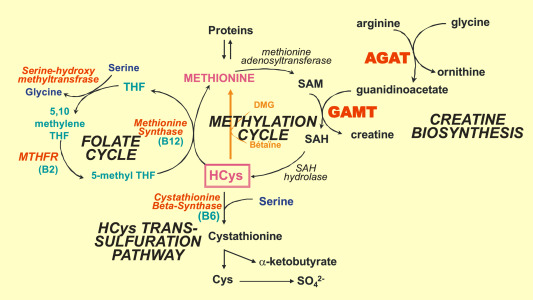
Creatine Improves Methylation
Creatine Supplementation: A Second Opinion Physician Hypothesis to Reduce Methylation Demand in Undermethylators
Methylation is a vital biochemical process that influences everything from DNA repair and neurotransmitter balance to detoxification and energy production. However, one of the largest single demands on the body’s methylation capacity is creatine synthesis, which accounts for 30-40% of all methylation reactions. For individuals with compromised methylation, such as undermethylators, this significant burden can limit the availability of methyl groups for other critical processes. Supplementing with exogenous creatine improves methylation by bypassing the need for endogenous synthesis, conserving methylation resources and enhancing overall metabolic efficiency. This simple yet effective strategy can significantly improve the health and energy balance of those with high methylation demands or limited capacity.
The Importance of Creatine Supplementation
Creatine is essential for energy production, particularly in high-demand tissues like muscles and the brain. It serves as a rapid energy buffer by regenerating ATP through the phosphocreatine system, supporting physical performance, recovery, and cognitive function. The body synthesizes creatine from the amino acids arginine, glycine, and methionine, with the final step requiring a methyl group donation from S-adenosylmethionine (SAMe). This methylation-dependent process, primarily occurring in the liver, places a heavy load on the body’s methylation cycle.
The demand for creatine increases during periods of intense exercise, growth, cognitive stress, aging, and illness. Additionally, individuals with limited dietary creatine intake—such as vegetarians and vegans—rely almost entirely on endogenous synthesis, further increasing methylation demand. For undermethylators, whose capacity to generate sufficient SAMe is already compromised, this creates a bottleneck that can impair other methylation-dependent processes, such as neurotransmitter metabolism, detoxification, and DNA repair.
Creatine Synthesized from SAMe
By supplementing with exogenous creatine, the body’s need to synthesize creatine endogenously is significantly reduced. This frees up methylation capacity, potentially increasing the availability of SAMe methyl groups for other vital functions by up to 30-40%. It is therefore logical to assume creatine treats undermethylation by the following mechanisms:
- Improved neurotransmitter activity and mood regulation.
- Enhanced detoxification and immune response.
- Increased energy and resilience against stress.
- Optimized DNA repair and cellular function.
Additionally, exogenous creatine directly supports muscle strength, recovery, and cognitive performance, offering both immediate and long-term health benefits. This dual action of reducing methylation demand while enhancing overall creatine availability makes supplementation a powerful tool for supporting individuals with methylation challenges.
How Creatine Is Formed and Its Link to Methylation
Creatine is synthesized endogenously in a two-step process:
- Guanidinoacetate Formation: Arginine and glycine combine to form guanidinoacetate in the kidneys and pancreas, catalyzed by arginine-glycine amidino transferase (AGAT).
- Methylation of Guanidinoacetate: Guanidinoacetate is transported to the liver, where it is methylated by guanidinoacetate methyltransferase (GAMT). This reaction requires S-adenosylmethionine (SAMe) as the methyl donor, a byproduct of methionine metabolism. SAMe is converted to S-adenosylhomocysteine (SAH) in the process.
As with SAH decomposition by the enzyme SAHH, alkalinity helps:
Why Alkalinity Helps:
- Alkaline conditions enhance SAMe stability, improving methyl group transfer.
- Alkalinity supports the enzymatic mechanism by maintaining the proper ionization state of the enzyme's active site and substrates.
- Acidic conditions impairs activity of SAHH enzyme, and thereby promotes the accumulation of S-adenosylhomocysteine (SAH), which inhibits GAMT, AGAT and other methyltransferases. GAMT and AGAT enzymes also perform better in an alkaline environment, which suggests that sodium bicarbonate and creatine would make good nutrient pair in treating cases of low SAMe and / or elevated SAH in undermethylated individuals.
The reliance on SAMe makes creatine synthesis the largest consumer of methyl groups in the body, accounting for 30-40% of methylation reactions. Reducing this demand by supplementing with exogenous creatine can significantly conserve methylation capacity. It is plausible that the combination of alkalinity and creatine improves methylation by a greater degree than either might alone.
What Creatine Does for the Brain and Muscles
Brain Benefits
- Depression and Cognitive Function: By reducing methylation demand, creatine allows for better neurotransmitter balance, benefiting individuals with undermethylation-related mood issues. Dr Dave, a practitioner of the Walsh Approach, believes this will allow significantly more SAMe to be available for DNA methylation thereby reducing serotonin reuptake and aiding undermethylators with related mood disorders. By maintaining ATP levels, creatine also enhances memory, focus, and mental clarity, particularly during periods of stress or fatigue.
- Neuroprotection: Creatine reduces oxidative stress and stabilizes mitochondrial function, protecting neurons from damage in conditions like Parkinson’s, ALS, and TBI.
- Mood Regulation: Improved methylation capacity indirectly supports neurotransmitter synthesis, benefiting individuals with mood disorders.
Muscle Benefits
- Increases Strength and Power: Creatine replenishes phosphocreatine stores, enabling rapid ATP regeneration during high-intensity activities.
- Supports Muscle Recovery: Reduces muscle damage and inflammation, speeding up post-exercise recovery.
- Enhances Muscle Growth: Boosts muscle hypertrophy when combined with resistance training.
- Prevents Muscle Wasting: Essential for preserving muscle mass in aging adults or during illness.
How to Supplement with Creatine to Improve Methylation
Recommended Dosages
- Maintenance Dose:
- 3–5 grams daily for general health, energy production, and performance support.
- Loading Phase (Optional):
- 15–20 grams daily for 5–7 days (split into 3–4 doses) to rapidly saturate muscles, followed by a maintenance dose.
- Therapeutic Dose:
- 5–10 grams daily for individuals with neurological conditions, chronic fatigue, or methylation impairments.
Tips for Supplementation
- Hydration: Ensure adequate water intake, as creatine increases water retention in muscles.
- Timing: Can be taken any time of day; taking creatine with a meal may improve absorption.
- Form: Creatine monohydrate is the most researched and effective form for supplementation.
resource:
Am J Physiol Endocrinol Metab
2001 Nov;281(5):E1095-100.
